Unit 1 What's the matter? 期中复习课件(共24张PPT)
文档属性
| 名称 | Unit 1 What's the matter? 期中复习课件(共24张PPT) |
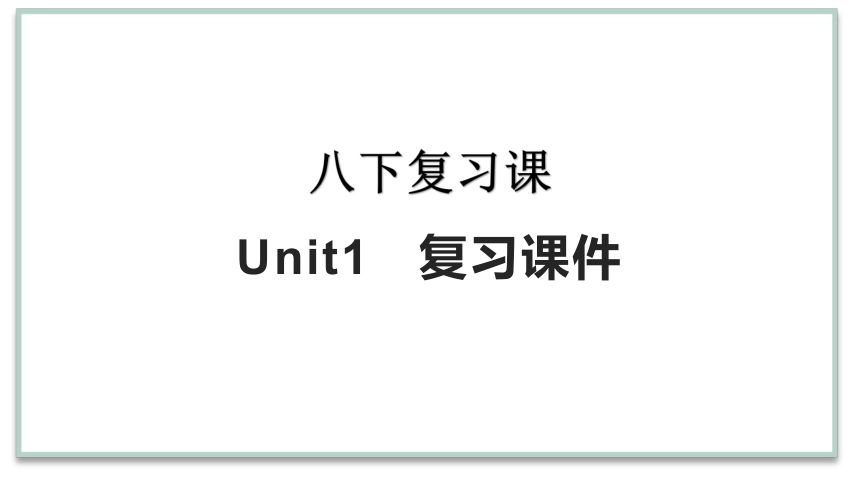
|
|
| 格式 | pptx | ||
| 文件大小 | 1.3MB | ||
| 资源类型 | 教案 | ||
| 版本资源 | 人教新目标(Go for it)版 | ||
| 科目 | 英语 | ||
| 更新时间 | 2024-04-16 16:27:34 | ||
图片预览

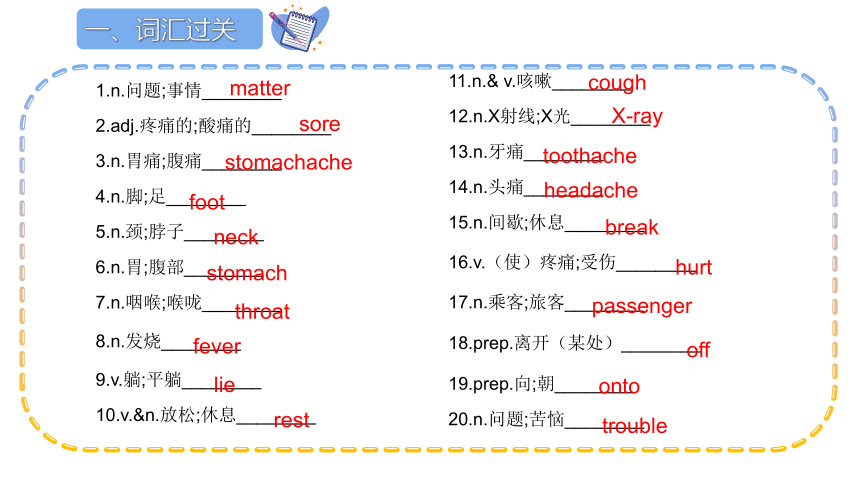
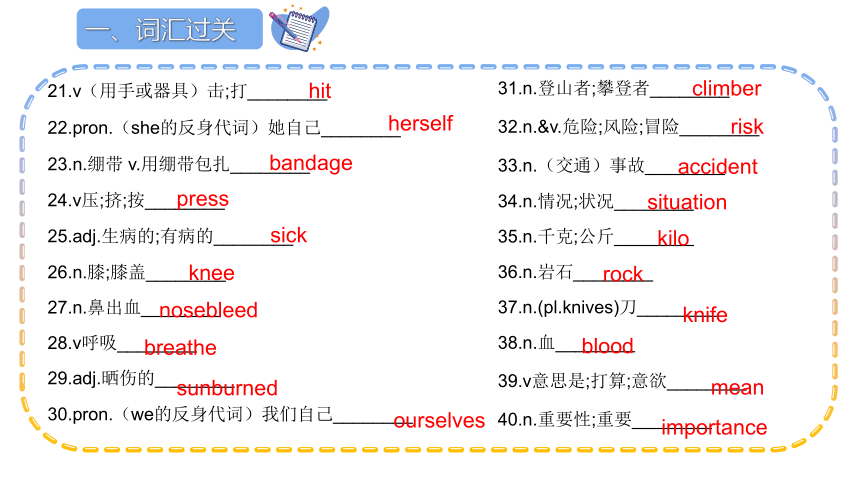
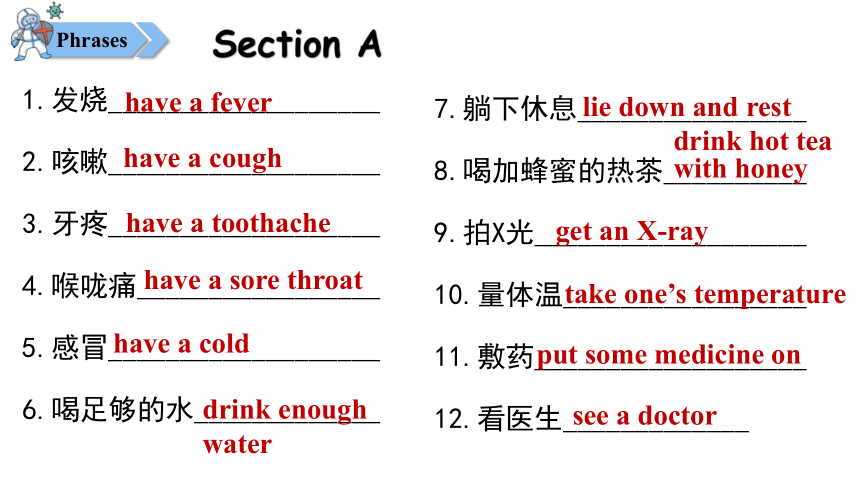
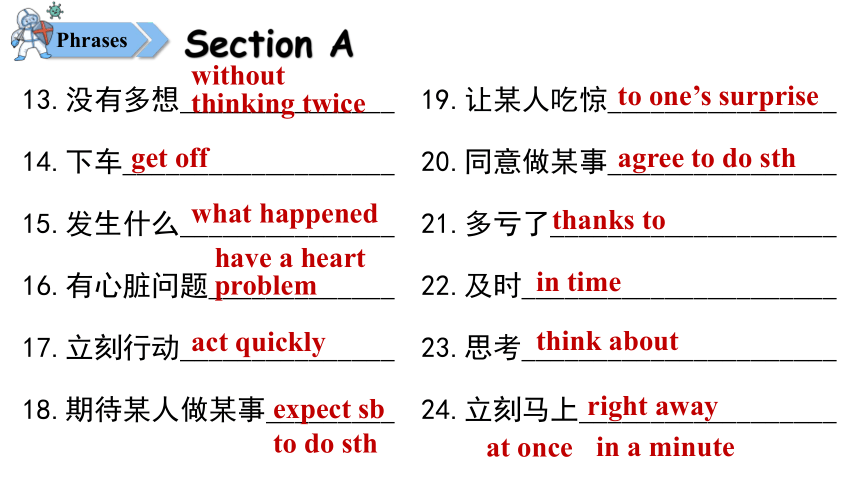
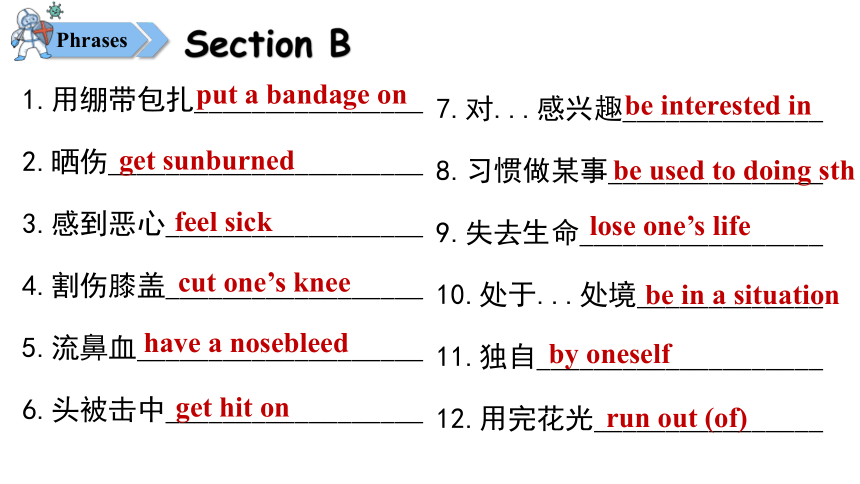
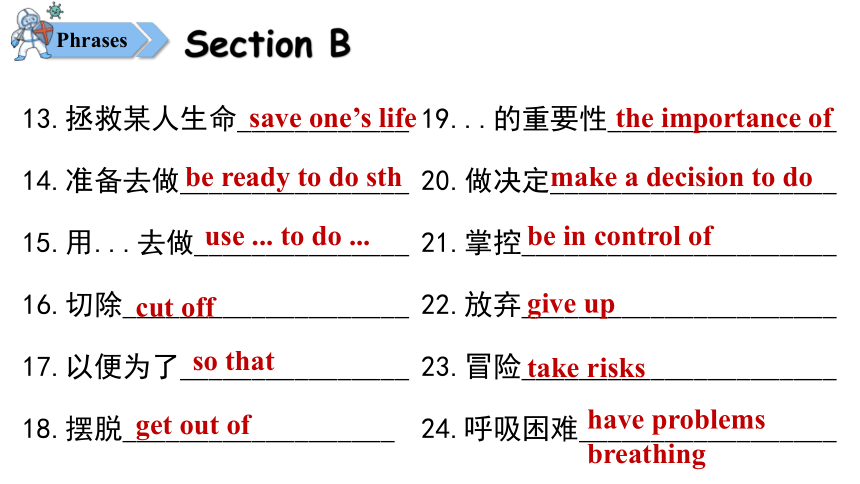
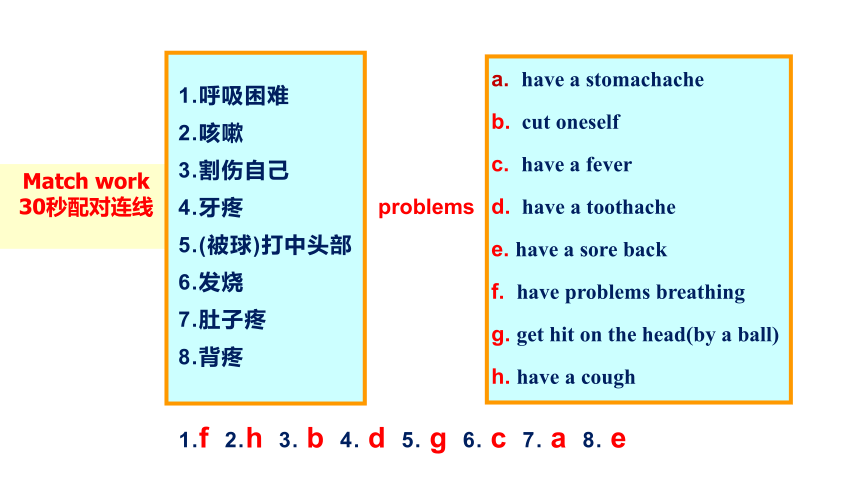
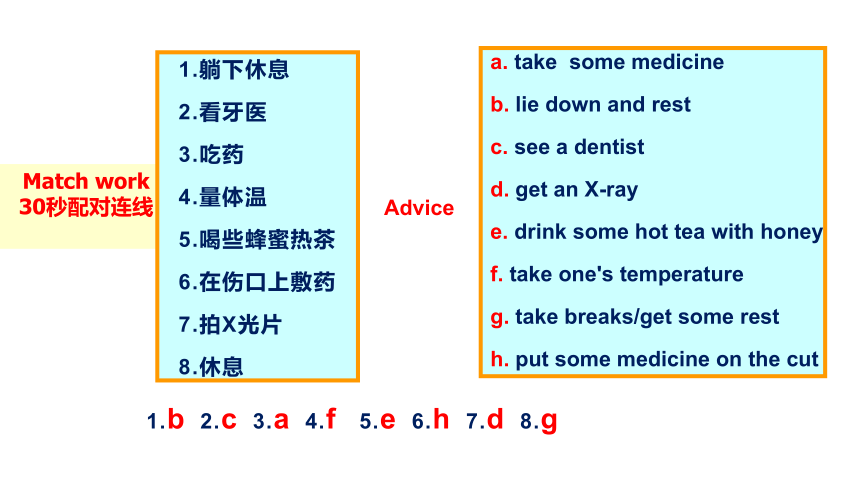
文档简介
(共24张PPT)
Unit1 复习课件
八下复习课
一、词汇过关
1.n.问题;事情________
2.adj.疼痛的;酸痛的________
3.n.胃痛;腹痛________
4.n.脚;足________
5.n.颈;脖子________
6.n.胃;腹部________
7.n.咽喉;喉咙________
8.n.发烧________
9.v.躺;平躺________
10.v.&n.放松;休息________
matter
sore
stomachache
foot
neck
stomach
throat
fever
lie
rest
11.n.& v.咳嗽________
12.n.X射线;X光________
13.n.牙痛________
14.n.头痛________
15.n.间歇;休息________
16.v.(使)疼痛;受伤________
17.n.乘客;旅客________
18.prep.离开(某处)________
19.prep.向;朝________
20.n.问题;苦恼________
cough
X-ray
toothache
headache
break
hurt
passenger
off
onto
trouble
一、词汇过关
21.v(用手或器具)击;打________
22.pron.(she的反身代词)她自己________
23.n.绷带 v.用绷带包扎________
24.v压;挤;按________
25.adj.生病的;有病的________
26.n.膝;膝盖________
27.n.鼻出血________
28.v呼吸________
29.adj.晒伤的________
30.pron.(we的反身代词)我们自己________
hit
herself
bandage
press
sick
knee
nosebleed
breathe
sunburned
ourselves
31.n.登山者;攀登者________
32.n.&v.危险;风险;冒险________
33.n.(交通)事故________
34.n.情况;状况________
35.n.千克;公斤________
36.n.岩石________
37.n.(pl.knives)刀________
38.n.血________
39.v意思是;打算;意欲________
40.n.重要性;重要________
climber
risk
accident
situation
kilo
rock
knife
blood
mean
importance
Phrases
1.发烧___________________
2.咳嗽___________________
3.牙疼___________________
4.喉咙痛_________________
5.感冒___________________
6.喝足够的水_____________
7.躺下休息________________
8.喝加蜂蜜的热茶__________
9.拍X光___________________
10.量体温_________________
11.敷药___________________
12.看医生_____________
have a fever
have a cough
have a toothache
have a sore throat
have a cold
drink enough water
lie down and rest
drink hot tea with honey
get an X-ray
take one’s temperature
put some medicine on
see a doctor
Section A
Phrases
13.没有多想_______________
14.下车___________________
15.发生什么_______________
16.有心脏问题_____________
17.立刻行动_______________
18.期待某人做某事_________
19.让某人吃惊________________
20.同意做某事________________
21.多亏了____________________
22.及时______________________
23.思考______________________
24.立刻马上__________________
without
thinking twice
get off
what happened
have a heart problem
act quickly
expect sb
to do sth
to one’s surprise
agree to do sth
thanks to
in time
think about
right away
at once
in a minute
Section A
Phrases
Section B
1.用绷带包扎________________
2.晒伤______________________
3.感到恶心__________________
4.割伤膝盖__________________
5.流鼻血____________________
6.头被击中__________________
7.对...感兴趣______________
8.习惯做某事_______________
9.失去生命_________________
10.处于...处境_____________
11.独自____________________
12.用完花光________________
put a bandage on
get sunburned
feel sick
cut one’s knee
have a nosebleed
get hit on
be interested in
be used to doing sth
lose one’s life
be in a situation
by oneself
run out (of)
Phrases
Section B
13.拯救某人生命____________
14.准备去做________________
15.用...去做_______________
16.切除____________________
17.以便为了________________
18.摆脱___________________
19...的重要性________________
20.做决定____________________
21.掌控______________________
22.放弃______________________
23.冒险______________________
24.呼吸困难__________________
save one’s life
be ready to do sth
use ... to do ...
cut off
so that
get out of
the importance of
make a decision to do
be in control of
give up
take risks
have problems breathing
Match work
30秒配对连线
1.呼吸困难
2.咳嗽
3.割伤自己
4.牙疼
5.(被球)打中头部
6.发烧
7.肚子疼
8.背疼
a. have a stomachache
b. cut oneself
c. have a fever
d. have a toothache
e. have a sore back
f. have problems breathing
g. get hit on the head(by a ball)
h. have a cough
1.f 2.h 3. b 4. d 5. g 6. c 7. a 8. e
problems
Match work
30秒配对连线
1.躺下休息
2.看牙医
3.吃药
4.量体温
5.喝些蜂蜜热茶
6.在伤口上敷药
7.拍X光片
8.休息
a. take some medicine
b. lie down and rest
c. see a dentist
d. get an X-ray
e. drink some hot tea with honey
f. take one's temperature
g. take breaks/get some rest
h. put some medicine on the cut
1.b 2.c 3.a 4.f 5.e 6.h 7.d 8.g
Advice
Yesterday, bus No.26 was______(go) along the road, when the bus driver, Wang Ping saw an old man ______(lie) on the side of the road. A woman next to him _____________(shout) for help. Mr.Wang stopped the bus without ________(think) twice.The woman ____(say) that the old man should____(go) to the hospital right away. Wang Ping_____(tell) the passengers that he must_____(take) the man to the hospital and expected them ______(get) off the bus. But to his surprise, they all agreed _____(go) with him. Thanks ____ their help, the doctors saved the man in time. "The driver did the right thing. He didn't think about himself. He only ________(think) about _________(save) a life."one said.
going
lying
was shouting
thinking
said
go
told
take
to get
to go
thought
saving
to
教材回归
●What’s the matter (with ...)
●What 's the trouble (with...)
●What's wrong (with ...)
●What happened (to ...)
如何询问病情
●Do you have…?
●Is there anything wrong (with…)
●Are you OK
...
特殊疑问句:
一般疑问句:
with/to 后如果跟人称代词时,采用的是人称代词的宾格形式。 him her them
如何描述病情
● 1. have + a/an + 疾病名词
a/an+ 身体部位-ache
a + sore + 身体部位
● 2.be/feel +adj.
● 3. hurt/cut + 反身代词或身体部位
身体部位+hurt
● ……
e.g. tooth+ ache = toothache(牙痛)
head, stomach, ear, back
e.g. sore throat
leg, foot, neck, back
e.g. have a cold/fever/cough/nosebleed…
-ache是表达“疼痛”的名词后缀,紧跟在名词后面,组成一个词,来扩展单词的含义
sore 是形容词,是表达“酸痛”,修饰名词
e.g. I am sick.
I don't feel well. My head feels very hot.
e.g. I cut my finger.
I hurt myself .
My leg hurts.
___________
___________
单元语法点回顾
一 情态动词should
1.should属于情态动词,意为“应该;应当”,不能单独作谓语,后接动词原形,没有人称和数的变化。should的否定形式为should not,缩写形式为shouldn't。在疑问句中should谓语主语前面。
2.should 用法:
(1)表示提出或征询建议,意为“应该”
e.g. I think you should save some money for your father's birthday.
【拓展延伸】
表建议的句型:
① Would you like (to do) sth.?你想要/愿意(做)某事吗?
② Shall I/we do sth. 我/我们做……好吗?
③ Why not do sth. =Why don't you do sth. 为什么不呢?
④ How/What about doing sth 做某事怎么样?
⑤ Let's do sth让我们做吧。
⑥ You'd better (not) do sth你最好(不)要做某事。
(2)表示责任或义务,意为“应该;应当”
e.g. We should follow the rules in public.
(3)表示推测,意为“照理说,应该”。表示肯定又了留有余地的推测,语气弱于must“一定”
e.g. Don't worry. Kate should arrive soon.
(4)表示说话人的特殊情感,如惊奇、愤怒、失望等,常与what, how, why, who连用,意为“竟然”
e.g. Don't ask me.How should I know
二 反身代词的用法
1. 构成:
人称 单数 复数
第一人称 myself ourselves
第二人称 yourself yourselves
第三人称 Himself,herself,itself themselves
2. 用法:
(1) 可用作宾语,指的是宾语和主语表示同一个或同一些的人或事物。
e.g. Maria bought herself a scarf.
(2) 可用作表语,指的是表语和主语表示同一个或同一些人或事物
e.g.She isn't quite herself today.
(3) 可用作主语或宾语的同位语,常用来加强语气。
e.g. She herself will fly to London tomorrow.
I met the writer himself last week.
(4) 用在某些固定短语当中,例如
by oneself意为“独自,凭自己”,相当于alone;
enjoy oneself“玩得高兴,过得愉快”,=have fun或have a good time;
help oneself to…“随便吃或喝点……,随便用……";
keep…to oneself意为“不将某事说出去”;
say to oneself意为“自言自语”。
3. 提醒
(1) 反身代词不能单独做主语,但可以做主语的同位语,起强调作用。
(2) 反身代词表示“某人自己”不能表示“某人的东西”,因为它没有所有格的形式。
表达“某人自己的(东西)”时,须要用one's own.
写作练习
范文
Dear Alan,I’m glad to receive your E-mail. As we all know, health is very important to everybody. But I know you often eat junk food and have some health problems. Here are some useful tips to help you keep fit.First, you should do exercise if you have time. For example, you can go to swim in the summer holiday. Or you can take a walk after supper. Doing exercise makes you healthy and strong. Second, you should take more vegetables and fruit and less candies. Stop eating junk food and drinking beers. Last but not least, you should go to bed early and wake up early. You should have enough sleep, or you will get sleepy in the day time.If you pay more attention to the tips above, you will be healthier than before. Hope you enjoy your life. May you be happy!Yours, Li Hua
假如你是李华,你的美国朋友Alan最近通过E-mail告诉你,他的身体不太好,比较胖,不爱运动,经常胃疼。请你给他写一封回信,告诉他如何保持身体健康。要求:主要包括以下内容,可以适当发挥。
提示短语:some useful advice, should do more exercise, eat a balanced diet(饮食平衡), stop eating junk food, enough sleep ….
书面表达
请根据以下信息,用英语写一篇不少于70词的短文。
1.昨天下午我和我的朋友们在雨中(in the rain)踢足球;
2.今天早上我觉得不舒服。我头疼、发烧并且喉咙痛;
3.我去看病。医生说我得了重感冒,告诉我要多喝水,并卧床休息两天,还给了我一些药;
4.回家后,我吃了药,感觉好多了。
One possible version:
I had a good time playing soccer with my friends in the rain yesterday afternoon. But this morning, I didn't feel well. I had a headache and a fever. I also had a sore throat. So I went to see the doctor. The doctor said I had a bad cold. He told me that I should drink lots of water and lie down and rest for two days. He also gave me some medicine. After taking the medicine, I felt much better.
根据汉语意思完成句子,每空一词。
1. 多亏那位年轻人,我们及时到达了火车站。
_________ _________ that young man, we arrived at the train station _____ _________.
2.我现在习惯住在这里。
I'm _________ _________ _________ here now.
Thanks
to
in
time
used
to
living
3. 刚才我看见一只猫从你的房间出来了。
Just now I saw a cat _________ _________ _________ your room.
4. 如果你想保护眼睛,你需要远离电脑休息一下。
If you want to protect your eyes, you need to __________ ___________ ________ ________ the computer.
5. 现在谁管理着这家计算机公司?
Who is ____ ____________ ____ this computer company now
get
out
of
take
breaks
away
from
in
control
of
Unit1 复习课件
八下复习课
一、词汇过关
1.n.问题;事情________
2.adj.疼痛的;酸痛的________
3.n.胃痛;腹痛________
4.n.脚;足________
5.n.颈;脖子________
6.n.胃;腹部________
7.n.咽喉;喉咙________
8.n.发烧________
9.v.躺;平躺________
10.v.&n.放松;休息________
matter
sore
stomachache
foot
neck
stomach
throat
fever
lie
rest
11.n.& v.咳嗽________
12.n.X射线;X光________
13.n.牙痛________
14.n.头痛________
15.n.间歇;休息________
16.v.(使)疼痛;受伤________
17.n.乘客;旅客________
18.prep.离开(某处)________
19.prep.向;朝________
20.n.问题;苦恼________
cough
X-ray
toothache
headache
break
hurt
passenger
off
onto
trouble
一、词汇过关
21.v(用手或器具)击;打________
22.pron.(she的反身代词)她自己________
23.n.绷带 v.用绷带包扎________
24.v压;挤;按________
25.adj.生病的;有病的________
26.n.膝;膝盖________
27.n.鼻出血________
28.v呼吸________
29.adj.晒伤的________
30.pron.(we的反身代词)我们自己________
hit
herself
bandage
press
sick
knee
nosebleed
breathe
sunburned
ourselves
31.n.登山者;攀登者________
32.n.&v.危险;风险;冒险________
33.n.(交通)事故________
34.n.情况;状况________
35.n.千克;公斤________
36.n.岩石________
37.n.(pl.knives)刀________
38.n.血________
39.v意思是;打算;意欲________
40.n.重要性;重要________
climber
risk
accident
situation
kilo
rock
knife
blood
mean
importance
Phrases
1.发烧___________________
2.咳嗽___________________
3.牙疼___________________
4.喉咙痛_________________
5.感冒___________________
6.喝足够的水_____________
7.躺下休息________________
8.喝加蜂蜜的热茶__________
9.拍X光___________________
10.量体温_________________
11.敷药___________________
12.看医生_____________
have a fever
have a cough
have a toothache
have a sore throat
have a cold
drink enough water
lie down and rest
drink hot tea with honey
get an X-ray
take one’s temperature
put some medicine on
see a doctor
Section A
Phrases
13.没有多想_______________
14.下车___________________
15.发生什么_______________
16.有心脏问题_____________
17.立刻行动_______________
18.期待某人做某事_________
19.让某人吃惊________________
20.同意做某事________________
21.多亏了____________________
22.及时______________________
23.思考______________________
24.立刻马上__________________
without
thinking twice
get off
what happened
have a heart problem
act quickly
expect sb
to do sth
to one’s surprise
agree to do sth
thanks to
in time
think about
right away
at once
in a minute
Section A
Phrases
Section B
1.用绷带包扎________________
2.晒伤______________________
3.感到恶心__________________
4.割伤膝盖__________________
5.流鼻血____________________
6.头被击中__________________
7.对...感兴趣______________
8.习惯做某事_______________
9.失去生命_________________
10.处于...处境_____________
11.独自____________________
12.用完花光________________
put a bandage on
get sunburned
feel sick
cut one’s knee
have a nosebleed
get hit on
be interested in
be used to doing sth
lose one’s life
be in a situation
by oneself
run out (of)
Phrases
Section B
13.拯救某人生命____________
14.准备去做________________
15.用...去做_______________
16.切除____________________
17.以便为了________________
18.摆脱___________________
19...的重要性________________
20.做决定____________________
21.掌控______________________
22.放弃______________________
23.冒险______________________
24.呼吸困难__________________
save one’s life
be ready to do sth
use ... to do ...
cut off
so that
get out of
the importance of
make a decision to do
be in control of
give up
take risks
have problems breathing
Match work
30秒配对连线
1.呼吸困难
2.咳嗽
3.割伤自己
4.牙疼
5.(被球)打中头部
6.发烧
7.肚子疼
8.背疼
a. have a stomachache
b. cut oneself
c. have a fever
d. have a toothache
e. have a sore back
f. have problems breathing
g. get hit on the head(by a ball)
h. have a cough
1.f 2.h 3. b 4. d 5. g 6. c 7. a 8. e
problems
Match work
30秒配对连线
1.躺下休息
2.看牙医
3.吃药
4.量体温
5.喝些蜂蜜热茶
6.在伤口上敷药
7.拍X光片
8.休息
a. take some medicine
b. lie down and rest
c. see a dentist
d. get an X-ray
e. drink some hot tea with honey
f. take one's temperature
g. take breaks/get some rest
h. put some medicine on the cut
1.b 2.c 3.a 4.f 5.e 6.h 7.d 8.g
Advice
Yesterday, bus No.26 was______(go) along the road, when the bus driver, Wang Ping saw an old man ______(lie) on the side of the road. A woman next to him _____________(shout) for help. Mr.Wang stopped the bus without ________(think) twice.The woman ____(say) that the old man should____(go) to the hospital right away. Wang Ping_____(tell) the passengers that he must_____(take) the man to the hospital and expected them ______(get) off the bus. But to his surprise, they all agreed _____(go) with him. Thanks ____ their help, the doctors saved the man in time. "The driver did the right thing. He didn't think about himself. He only ________(think) about _________(save) a life."one said.
going
lying
was shouting
thinking
said
go
told
take
to get
to go
thought
saving
to
教材回归
●What’s the matter (with ...)
●What 's the trouble (with...)
●What's wrong (with ...)
●What happened (to ...)
如何询问病情
●Do you have…?
●Is there anything wrong (with…)
●Are you OK
...
特殊疑问句:
一般疑问句:
with/to 后如果跟人称代词时,采用的是人称代词的宾格形式。 him her them
如何描述病情
● 1. have + a/an + 疾病名词
a/an+ 身体部位-ache
a + sore + 身体部位
● 2.be/feel +adj.
● 3. hurt/cut + 反身代词或身体部位
身体部位+hurt
● ……
e.g. tooth+ ache = toothache(牙痛)
head, stomach, ear, back
e.g. sore throat
leg, foot, neck, back
e.g. have a cold/fever/cough/nosebleed…
-ache是表达“疼痛”的名词后缀,紧跟在名词后面,组成一个词,来扩展单词的含义
sore 是形容词,是表达“酸痛”,修饰名词
e.g. I am sick.
I don't feel well. My head feels very hot.
e.g. I cut my finger.
I hurt myself .
My leg hurts.
___________
___________
单元语法点回顾
一 情态动词should
1.should属于情态动词,意为“应该;应当”,不能单独作谓语,后接动词原形,没有人称和数的变化。should的否定形式为should not,缩写形式为shouldn't。在疑问句中should谓语主语前面。
2.should 用法:
(1)表示提出或征询建议,意为“应该”
e.g. I think you should save some money for your father's birthday.
【拓展延伸】
表建议的句型:
① Would you like (to do) sth.?你想要/愿意(做)某事吗?
② Shall I/we do sth. 我/我们做……好吗?
③ Why not do sth. =Why don't you do sth. 为什么不呢?
④ How/What about doing sth 做某事怎么样?
⑤ Let's do sth让我们做吧。
⑥ You'd better (not) do sth你最好(不)要做某事。
(2)表示责任或义务,意为“应该;应当”
e.g. We should follow the rules in public.
(3)表示推测,意为“照理说,应该”。表示肯定又了留有余地的推测,语气弱于must“一定”
e.g. Don't worry. Kate should arrive soon.
(4)表示说话人的特殊情感,如惊奇、愤怒、失望等,常与what, how, why, who连用,意为“竟然”
e.g. Don't ask me.How should I know
二 反身代词的用法
1. 构成:
人称 单数 复数
第一人称 myself ourselves
第二人称 yourself yourselves
第三人称 Himself,herself,itself themselves
2. 用法:
(1) 可用作宾语,指的是宾语和主语表示同一个或同一些的人或事物。
e.g. Maria bought herself a scarf.
(2) 可用作表语,指的是表语和主语表示同一个或同一些人或事物
e.g.She isn't quite herself today.
(3) 可用作主语或宾语的同位语,常用来加强语气。
e.g. She herself will fly to London tomorrow.
I met the writer himself last week.
(4) 用在某些固定短语当中,例如
by oneself意为“独自,凭自己”,相当于alone;
enjoy oneself“玩得高兴,过得愉快”,=have fun或have a good time;
help oneself to…“随便吃或喝点……,随便用……";
keep…to oneself意为“不将某事说出去”;
say to oneself意为“自言自语”。
3. 提醒
(1) 反身代词不能单独做主语,但可以做主语的同位语,起强调作用。
(2) 反身代词表示“某人自己”不能表示“某人的东西”,因为它没有所有格的形式。
表达“某人自己的(东西)”时,须要用one's own.
写作练习
范文
Dear Alan,I’m glad to receive your E-mail. As we all know, health is very important to everybody. But I know you often eat junk food and have some health problems. Here are some useful tips to help you keep fit.First, you should do exercise if you have time. For example, you can go to swim in the summer holiday. Or you can take a walk after supper. Doing exercise makes you healthy and strong. Second, you should take more vegetables and fruit and less candies. Stop eating junk food and drinking beers. Last but not least, you should go to bed early and wake up early. You should have enough sleep, or you will get sleepy in the day time.If you pay more attention to the tips above, you will be healthier than before. Hope you enjoy your life. May you be happy!Yours, Li Hua
假如你是李华,你的美国朋友Alan最近通过E-mail告诉你,他的身体不太好,比较胖,不爱运动,经常胃疼。请你给他写一封回信,告诉他如何保持身体健康。要求:主要包括以下内容,可以适当发挥。
提示短语:some useful advice, should do more exercise, eat a balanced diet(饮食平衡), stop eating junk food, enough sleep ….
书面表达
请根据以下信息,用英语写一篇不少于70词的短文。
1.昨天下午我和我的朋友们在雨中(in the rain)踢足球;
2.今天早上我觉得不舒服。我头疼、发烧并且喉咙痛;
3.我去看病。医生说我得了重感冒,告诉我要多喝水,并卧床休息两天,还给了我一些药;
4.回家后,我吃了药,感觉好多了。
One possible version:
I had a good time playing soccer with my friends in the rain yesterday afternoon. But this morning, I didn't feel well. I had a headache and a fever. I also had a sore throat. So I went to see the doctor. The doctor said I had a bad cold. He told me that I should drink lots of water and lie down and rest for two days. He also gave me some medicine. After taking the medicine, I felt much better.
根据汉语意思完成句子,每空一词。
1. 多亏那位年轻人,我们及时到达了火车站。
_________ _________ that young man, we arrived at the train station _____ _________.
2.我现在习惯住在这里。
I'm _________ _________ _________ here now.
Thanks
to
in
time
used
to
living
3. 刚才我看见一只猫从你的房间出来了。
Just now I saw a cat _________ _________ _________ your room.
4. 如果你想保护眼睛,你需要远离电脑休息一下。
If you want to protect your eyes, you need to __________ ___________ ________ ________ the computer.
5. 现在谁管理着这家计算机公司?
Who is ____ ____________ ____ this computer company now
get
out
of
take
breaks
away
from
in
control
of
同课章节目录
- Unit 1 What's the matter?
- Section A
- Section B
- Unit 2 I'll help to clean up the city parks.
- Section A
- Section B
- Unit 3 Could you please clean your room?
- Section A
- Section B
- Unit 4 Why don't you talk to your parents?
- Section A
- Section B
- Unit 5 What were you doing when the rainstorm came
- Section A
- Section B
- Review of Units 1-5
- Unit 6 An old man tried to move the mountains.
- Section A
- Section B
- Unit 7 What's the highest mountain in the world?
- Section A
- Section B
- Unit 8 Have you read Treasure Island yet?
- Section A
- Section B
- Unit 9 Have you ever been to a museum?
- Section A
- Section B
- Unit 10 I've had this bike for three years.
- Section A
- Section B
